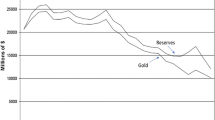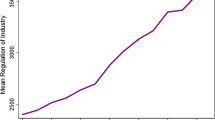Abstract
A growing body of literature analyzing the distributive consequences of regulation suggests that regulation may have particularly detrimental effects on lower-income households. Regulation can be regressive if it represents the preferences of the wealthy while imposing costs on all households. The specific channel through which regulation may impose costs on lower-income households is its effects on prices and wages. In this issue, Chambers et al. (Public Choice. https://doi.org/10.1007/s11127-017-0479-z, 2017) investigate the impact of regulation on prices. They find that regulation raises consumer prices; regulatory interventions therefore are regressive because lower income consumers tend to spend larger percentages of their budgets on regulated goods and services. In this paper, we seek to analyze the effect of regulation on wages across different income levels and occupations.
Similar content being viewed by others
Notes
Thomas (2012) argues that regulation often targets the mitigation of low-probability, high-cost risks, reflecting the preferences of high-income households. In the absence of intervention, low-income households would mitigate higher probability, lower-cost risks first. Regulation displaces some private risk mitigation efforts and, moreover, public action aimed at reducing overall exposure to environmental and safety risks mainly indulge the risk-mitigation preferences of wealthier households. Because all households bear the costs of regulation in the form of higher prices and lower wages, the effects of public regulation of health and safety risks are regressive.
Aidt (2003) shows that distributive programs that offer inefficient subsidies are unlikely to be contested politically. Programs that employ inefficient means of taxation are, on the contrary, likely to be contested. He also shows, relying on an extended version of Becker’s (1983) pressure group model, that contrary to Becker’s predictions, on the whole, political competition increases rent seeking activity and that in the absence of such competition, the total social costs of regulatory intervention are self-limiting.
Hillman (1982) likewise analyzes the dynamics of rent seeking among politicians, industry representatives and all other voters.
See Al-Ubaydli and McLaughlin (2015) for details on the database’s construction.
References
Aidt, T. S. (2003). Redistribution and deadweight cost: the role of political competition. European Journal of Political Economy, 19, 205–226.
Aidt, T. S. (2010). Green taxes: Refunding rules and lobbying. Journal of Environmental Economics and Management, 60, 31–43.
Akerlof, G. A. (1970). The market for “lemons”: Quality uncertainty and the market mechanism. The Quarterly Journal of Economics, 84(3), 488–500.
Al-Ubaydli, O., & McLaughlin, P. (2015). RegData: A numerical database on industry-specific regulations for all U.S. industries and federal regulations, 1997-2012. Regulation and Governance, 11(1), 109–123.
Bailey, J., & Thomas, D. (2017). Regulating away competition: The effect of regulation on entrepreneurship and employment. Journal of Regulatory Economics, 52(3), 237–254.
Baumol, W. J., & Oates, W. E. (1988). The theory of environmental policy (2nd ed.). Englewood Cliffs, NJ: Prentice-Hall.
Becker, G. S. (1983). A theory of competition among pressure groups for political influence. Quarterly Journal of Economics, 98(3), 371–400.
Chambers, D., Collins, C. A., & Krause, A. (2017). How do federal regulations affect consumer prices? An analysis of the regressive effects of regulation. Public Choice. https://doi.org/10.1007/s11127-017-0479-z.
Chambers, D., McLaughlin, P., & Stanley, L. (2018) Barriers to prosperity: The harmful impact of entry regulations on income inequality. Public Choice.
Douglas, G. W., & Miller, J. C., III. (1974). Quality competition, industry equilibrium, and efficiency in the price-constrained airline market. American Economic Review, 64(4), 657–669.
Hillman, A. L. (1982). Declining industries and political-support protectionist motives. The American Economic Review, 72(5), 1180–1187.
Hoffer, A., Gvillo, R., Shughart, W. F., II, & Thomas, M. D. (2017). Income-expenditure elasticities of less-healthy consumption goods. Journal of Entrepreneurship and Public Policy, 6(1), 2–10.
Jones, P. R., & Cullis, J. G. (1986). Is democracy regressive? A comment on political participation. Public Choice, 51(1), 101–107.
Kamath, S. J. (1989). Concealed takings: capture and rents-seeking in the Indian sugar industry. Public Choice, 62(2), 119–138.
Keeler, T. E. (1972). Airline regulation and market performance. The Bell Journal of Economics and Management Science, 3(2), 399–424.
Maloney, M. T., & McCormick, R. E. (1982). A positive theory of environmental quality regulation. Journal of Law and Economics, 25(1), 99–124.
Marvel, H. P. (1977). Factory regulation: A reinterpretation of early English experience. Journal of Law and Economics, 20(2), 379–402.
McChesney, F. S. (1987). Rent extraction and interest-group organization in a coasean model of regulation. The Journal of Legal Studies, 20(1), 73–90.
McKenzie, I. A. (2017). Rent creation and rent seeking in environmental policy. Public Choice, 171(1–2), 145–166.
Moore, T. G. (1978). The beneficiaries of trucking regulation. The Journal of Law & Economics, 21(2), 327–343.
Paul, C. W. (1982). Competition in the medical profession: An application of the economic theory of regulation. Southern Economic Journal, 48(3), 559–569.
Peltzman, S. (1976). Toward a more general theory of regulation. The Journal of Law and Economics, 19(2), 211–240.
Peltzman, S., Levine, M. E., & Noll, R. G. (1989). The economic theory of regulation after a decade of deregulation. Brookings Papers on Economic Activity. Microeconomics, 1989, 1–59.
Pigou, A. (1920). The economics of welfare. London: Macmillan and Co.
Shepard, L. (1978). Licensing restrictions and the cost of dental care. Journal of Law and Economics, 21(1), 187–201.
Stigler, G. J. (1971). The theory of economic regulation. The Bell Journal of Eocnomics and Managment Science, 2(1), 3–21.
Thomas, D. (2012). Regressive effects of regulation. Mercatus Working Paper.
Thomas, M. (2017). Regressive effects of paternalism. Public Choice.
Tullock, G. (1967). The welfare cost of tariffs, monopolies, and theft. Western Economic Journal, 5, 224–232.
Williamson, O. E. (1968). Wage rates as a barrier to entry: the Pennington case in perspective. Quarterly Journal of Economics, 82(1), 85–116.
Author information
Authors and Affiliations
Corresponding author
Appendix
Rights and permissions
About this article
Cite this article
Bailey, J.B., Thomas, D.W. & Anderson, J.R. Regressive effects of regulation on wages. Public Choice 180, 91–103 (2019). https://doi.org/10.1007/s11127-018-0517-5
Received:
Accepted:
Published:
Issue Date:
DOI: https://doi.org/10.1007/s11127-018-0517-5




